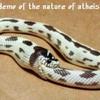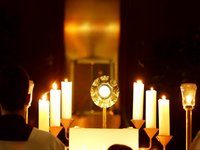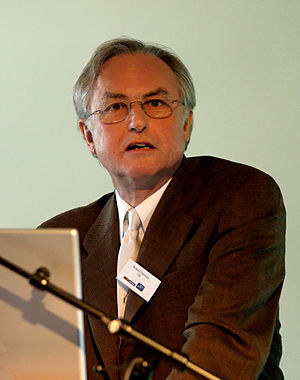Previously I talked about Richard Dawkins calling for the open mockery of Catholic beliefs. And while his type of atheism has grown more militant over the years, it still fails to move people the same way God can through the power of the Holy Spirit. To show you the power of faith, here’s a story of another atheist, actually a former atheist — Father Carlos Martins. Like many Catholics, he was “Catholic in name only” and later fell under the influence of intellectual atheism — the type promoted by Dawkins. But it was through Eucharistic Adoration that he came to know the very real presence of Christ and not only found his faith, but took up a priestly vocation. He now leads people in the veneration of sacred relics.
Father Carlos Martins proves the power and joy that comes from a life of faith. Faith can’t be quantified, measured, or adequately explained. It certainly can’t be summarized in a few sentences if confronted by an “intellectual” atheist. But faith’s power cannot be denied. After all, it has turned many non-believers, like Father Carlos Martins, into staunch defenders of God’s presence in our world. It has provided strength to millions of saints, martyrs, and believers throughout the centuries. Those are real changes to real people and not just some intellectual exercise on how the world might be better by throwing off the shackles of religion as atheists would have us believe.
Let’s compare faith vs. intellectual atheism. New atheists like Dawkins believe that an atheistic world will be happier because people aren’t restricted by the silly bonds of religion. But can we truly have a happier world without faith? Were the Soviet Union, China, and North Korea happy places when they tried to build a society without religion? I think that’s a pretty obvious “no.” But why are these faithless societies generally unhappy? Without acknowledging the consequences of sin or the comforting power of grace that comes through faith, society just wonders aimlessly without any purpose. It doesn’t matter whether your life revolves around helping people or hurting them. The motivation for doing anything good or productive comes from the coercive nature of government and the laws and penalties they enforce. In this void, people tend to create false faiths out of political causes like environmentalism, global warming, contraception, identity politics, etc. But these false faiths don’t truly satisfy our spiritual needs similar to how eating only candy will not sustain physical health. A world without God will never sustain society because deep down, people need faith to be a complete person. This is what Father Carlos Martins realized — atheism is ultimately a dead-end because it denies someone a crucial factor for living a fulfilling and happy life.
Now look at the faithful, religious people. People who live the faith (and not just give it lip service) have a deep sense of happiness and peace through God’s grace. They realize that life won’t always be easy and there might be some suffering, but they find the confidence and energy to live according to a higher will. They help the less fortunate, set up shelters, charities, and hospitals, and do any number of good deeds, not because they are coerced by the government, but because they want to share God’s love. Because they don’t deny faith as a crucial part of their humanity, that faith develops, strengthens, and motivates them to lead a more fulfilling life and help others to do the same. You can’t deny that religious institutions, either through parishes, charities, or hospitals, make a real difference in people’s lives.
So here we have the reality of happiness through faith vs. the faith of hopelessness through atheism. I don’t know about you, but I’m sticking with the side that already has the proven track record of generating real change for the better — the life of faith. When I pray the rosary, I pray for the conversion of heart, mind, and soul to be truly aligned with God’s will as Jesus asks of us in the Third Luminous Mystery. God is present in this world and He calls you to a life of conversion. Will you be like Father Carlos Martins, the saints, and the millions of faithful Catholics and accept this calling?
Related articles
 Yet Another Atheist Doesn’t Get His Own Position(borne.wordpress.com)
Yet Another Atheist Doesn’t Get His Own Position(borne.wordpress.com)
- Why Atheists Don’t Exist (incisivereview.com)
- What the Secular World Can Learn From Religion (theatlantic.com)
- How to make something from nothing (choiceindying.com)




